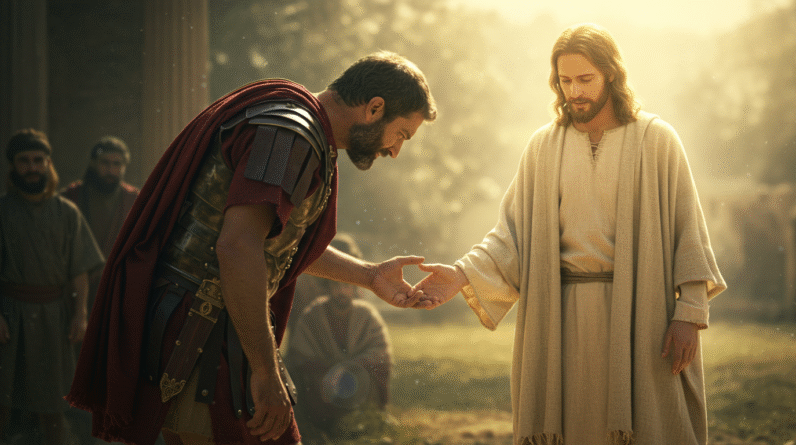Explore the transformative power of peacemaking in biblical narratives through Matthew 5:9 and 1 Samuel 25:23-35, discovering lessons of harmony and courage.

Introduction
In the vast tapestry of biblical narratives, the concept of peacemaking emerges as a powerful and transformative theme. Imagine living in a world where strife and conflict are prevalent, and stepping up as a force of reconciliation seems almost heroic. The Bible offers profound insights into this role through various characters and teachings. One such beacon of peacemaking is found in two distinguished instances: Matthew 5:9 and the story of Abigail in 1 Samuel 25:23-35. These passages embody the essence of those who dare to be peacemakers amid turmoil, underscoring the vital role they play in both divine and human narratives.
The Peacemakers in Matthew 5:9
The Beatitudes and Their Significance
The Beatitudes, recorded in the book of Matthew, form the cornerstone of Jesus’ Sermon on the Mount and set forth profound truths about kingdom values. Among them stands a directive that transcends time and culture: “Blessed are the peacemakers, for they will be called children of God” – Matthew 5:9. At the heart of this verse is the call to embody peace, encouraging followers to actively foster harmony rather than merely maintain it.
Who Are the Peacemakers?
Peacemakers are individuals who not only abstain from conflict but actively work towards reconciliation. They have an innate ability to see beyond present disputes and envision a harmonious future. Their significance lies in their divine association; being called ‘children of God’ implies a spiritual kinship with the divine nature of peace itself. This identity, thus, becomes both a calling and a mission for those seeking to emulate this beatific trait.
Abigail’s Story in 1 Samuel 25:23-35
Abigail’s Role
In the gripping narrative of 1 Samuel 25:23-35, we meet Abigail, a woman epitomizing wisdom and grace amidst adversity. Married to the churlish Nabal, Abigail faced a dire situation when her husband’s foolishness nearly led to disaster upon their household, due to Nabal’s refusal to aid David and his men during a feast. Her courageous intercession, marked by humility and insight, prevented bloodshed and demonstrated the profound impact of a well-judged act of peacemaking.
Abigail’s Tactical Peacemaking
Abigail’s approach was marked by action, discretion, and timing. Riding out to meet David, she prepared with generous provisions and a humble posture, offering not just an apology, but a vision for peace. Her decisive steps disrupted the cycle of vengeance, highlighting how proactive peacemaking can avert impending violence. Abigail’s story emphasizes the power of individual agency in peace processes, showcasing her wisdom as she tactfully negotiated peace. Her acumen underscored a sophisticated understanding of human emotions and socio-political dynamics.
The Outcome of Her Actions
Thanks to Abigail’s intervention, peace was restored and David was prevented from committing needless violence in his wrath. Her adept mediation turned the potential conflict into a moment of divine teaching for David, who recognized the wisdom in her counsel. Abigail’s actions didn’t just preserve her household; they earned her respect and admiration, ultimately leading to a new beginning as David’s wife following Nabal’s death. This thrilling narrative displays the tangible results of effective peacemaking.
Lessons from Their Lives
Embracing the Role of a Peacemaker
From the Sermon on the Mount to Abigail’s story, the role of a peacemaker emerges as one requiring active compassion and boldness. These narratives teach us to move beyond the passive desire for tranquility towards proactive engagement with conflict, taking steps to mediate, reconcile, and restore. Peacemakers understand that building bridges is as crucial as advocating for justice.
The Power of Wisdom and Understanding
Abigail’s story teaches the importance of wisdom and discernment in peacemaking. Her actions highlight how understanding the perspectives of others can facilitate resolution. In a divided world, approaching conflict with empathy can transform relationships and communities. Wisdom allows peacemakers to foresee the potentially destructive outcomes of conflict and devise strategic interventions.
Divine Blessing and Human Effort
Being a peacemaker, as prescribed in Matthew 5:9, suggests a partnership between divine blessing and human effort. It reminds us that while the spirit of peace is a gift, there is an active effort required on our part to manifest it in our surroundings. This highlights the balance between divine eminence and our responsibility to cultivate peace.
Connection to Today’s World
Peacemaking in Our Lives
In today’s fast-paced and often fractured society, the need for peacemakers is as urgent as ever. Conflicts arise not only on the global stage but also within our communities and personal relationships. By learning from biblical exemplars like Abigail, we can engage in active listening, respectful dialogue, and strategic action to bridge divides and foster peace. These stories encourage us to be agents of change in our families, workplaces, and communities.
Modern Relevance of Biblical Stories
The biblical lessons of peacemaking offer timeless guidance that extends beyond religious settings. In civic engagement, business negotiations, or community leadership, the principles of reconciliation, understanding, and effective communication are critical. By viewing these teachings through a modern lens, we see their applicability in diverse sectors, guiding us toward more empathetic and collaborative interactions.
Key Bible Verse
An Embodiment of Divine Call
“Blessed are the peacemakers, for they will be called children of God.” – Matthew 5:9
This verse encapsulates the divine calling and identity bestowed upon peacemakers. It signifies a special relationship with God, marking those who pursue peace as allied with His nature and purpose. As peacemakers, you’re invited into a familial relationship with the Divine, symbolizing your crucial role in advancing peace on Earth. It’s an invitation to embody divine attributes of love, grace, and justice in everyday interactions.
Thought-Provoking Question
In the spirit of reflection, consider this: How are you living out the calling to be a peacemaker in your own sphere of influence? In the face of discord, are you acting with the wisdom and courage exemplified by biblical peacemakers like Abigail, or do you find yourself retreating to more comfortable positions of passivity?
Optional Add-Ons
Historical/Cultural Context
Understanding the cultural context of ancient Israel enriches our appreciation of Abigail’s role. As a woman in a patriarchal society, her influence and actions were both remarkable and counter-cultural. Her story challenges the gender norms of her time and provides a powerful example of how wisdom can transcend societal limitations, offering a valuable perspective for modern gender conversations.
Comparison with Other Characters
Contrasting Abigail with other biblical figures like Esther reveals similarities and distinctive traits in peacemaking. Esther, like Abigail, took a bold step to save her people, but in a different context and manner. Both women reveal layers of courage, wisdom, and influence, providing rich lessons for tackling conflict from different angles. They showcase how varied approaches to peacemaking can achieve profound outcomes.
Prayer
Reflect on these biblical teachings with a heart of gratitude:
“Heavenly Father, grant me the courage and wisdom to be a peacemaker in my own life, as Abigail was in hers. May I seek Your guidance in moments of conflict and be an instrument of Your peace in the world. Amen.”
In exploring the lives of peacemakers within biblical narratives, may you find inspiration and encouragement as you embark on your path of reconciliation and harmony-building. Peacemaking is an arduous yet rewarding journey, inviting you to join in a divine commitment to bringing love, understanding, and peace to a world yearning for it.







